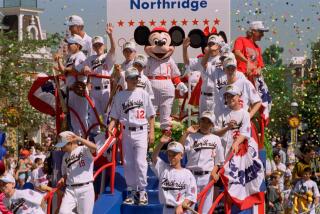Air of Familiarity for Sharts in Regionals : College baseball: Northridge slugger will see former Miami teammates in NCAA playoffs.
- Share via
Scott Sharts and the University of Miami are playing in the NCAA West II baseball regional at Fresno State, starting Thursday, but not together.
Sharts, whose 22 home runs this season have earned him a place among college baseball’s top power hitters, transferred from Miami after his freshman season to Cal State Northridge, where he has played the last two seasons.
At Miami, his home runs came in batting practice, which is why he wore a tape-measure smile Monday when it was announced that Northridge would be in the same regional as the Hurricanes.
“I’m real excited,” said Sharts, a 6-foot-6, 217-pound junior. “I want to show those coaches what I can do.”
Those coaches called Sharts more often by number than by name for weeks in the fall of 1988.
“It was like, ‘You’re the big guy from California, aren’t ya?’ And I’d say, ‘Yeah, that’s me.’ ” Sharts said.
At Northridge, Sharts has been the big guy, period. He has driven in 139 runs and hit a school-record 51 homers the past two seasons and won 16 games as a pitcher.
As a youngster, Sharts had watched his older brother Steve pitch for a Northridge team that won the Division II national championship in 1984.
“I went to just about all of Northridge’s games,” Sharts said. “But when the time came I never even thought of going there. Then reality hit, and I realized that was where I wanted to be.”
Sharts had his choice of colleges after hitting a Southern Section-record 32 home runs for Simi Valley High. Professional baseball, which Sharts really wanted, was about the only avenue closed.
Two weeks after major league baseball’s June, 1988, draft, Sharts found out exactly how far home-run hitting could carry him. He got a telegram saying he had been selected by the Pittsburgh Pirates.
It failed to mention that he had been chosen in the 56th round.
When a Pirate scout visited Sharts a few days later, a contract wasn’t even discussed. Instead it was suggested that Sharts start a running program and a month later attend a Pirate tryout camp.
Sharts followed the conditioning program religiously, hit well while showing improvement on the basepaths during the tryout and afterward received additional feedback from the Pirates.
“Basically they told me to have a good college career,” Sharts said.
And so he has. But even that hasn’t gone according to plan.
Sharts started 10 games at first base for Miami, but he finished his freshman season with only 36 at-bats. Relegated to pitching in middle relief, Sharts already had planned his departure by the time Miami secured a spot in the 1989 College World Series.
Released from his scholarship, Sharts had friends spread the word he was available. Cal State Fullerton and Loyola Marymount were interested, but Northridge Coach Bill Kernen made the most intriguing pitch.
The Northridge offer: 250 at-bats, a year playing at the Division II level to be used for getting his batting stroke back and a job at first base when he wasn’t pitching.
Northridge, perennially a small-college contender, was in a transitional phase and pointed toward this season, its first in Division I.
Kernen, Augie Garrido’s former assistant at Fullerton and Illinois, fielded a lineup of freshmen and sophomores, and Sharts fit squarely in the middle. He batted third and played in every game.
His numbers earned him a spot on the Division II All-American team. He had a 6-3 record as a pitcher but, more significantly, batted .305 with 76 runs batted in and a school single-season record 29 home runs.
Point proven? Not exactly. There was still the question of whether Sharts’ numbers would hold up in Division I.
His home run pace is only slightly behind that of last season. He has 63 RBIs and is batting .297 while averaging almost a walk a game. As a pitcher, Sharts has a 10-6 record, a 3.38 earned-run average and 133 strikeouts in 144 innings.
Northridge, the surprise of the season, is 41-16-1.
“The confidence Kernen has shown in me has made all the difference,” Sharts said. “These last two seasons have been the toughest baseball years of my life. I’ve never worked as hard or had as much pressure put on me before, but it has all paid off.”
Sharts, though, is not a cinch in next month’s draft. His lack of speed limits him to first base and his fastball, which is normally clocked in the low- to mid-80 m.p.h range, is considered average by professional standards.
George Genovese, longtime scout for the San Francisco Giants, said Sharts will probably first be tried as a full-time hitter.
“You never know,” Genovese said. “I signed Jack Clark as a pitcher, and he lasted two weeks before they had him in the lineup every day (for his hitting).”
Truth be told, Sharts would like to continue to pitch and hit.
Kernen considers Sharts a prospect in both areas and finds concern about his speed mildly amusing.
“I wonder,” Kernen said, “just how fast he needs to be to trot around the bases.”
More to Read
Go beyond the scoreboard
Get the latest on L.A.'s teams in the daily Sports Report newsletter.
You may occasionally receive promotional content from the Los Angeles Times.











